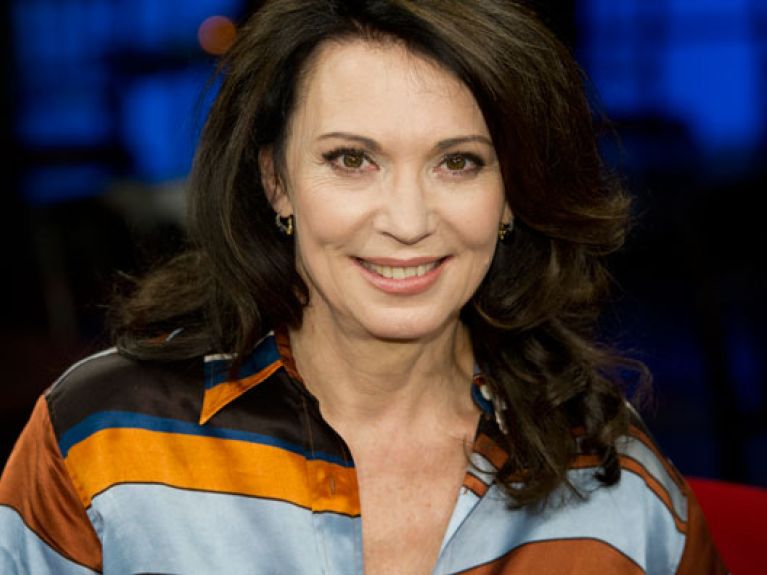Iris Berben – hungry for life
In films and television Iris Berben plays powerful female roles. And in real life she takes a firmly committed stance

The first glimpse is of a bent over back in black. Iris Berben is sitting in a hotel in Berlin and doesn’t even lift her head as we enter the room for the interview. How slim she is! How impolite! She suddenly turns, jumps to her feet and apologizes, her smartphone still in her hand: she has just found out that Germany’s social democrats have agreed on a candidate for the chancellorship. Iris Berben is literally trembling with excitement. And before returning to her easy chair, where she sits upright this time, before talking about her background and career, bubbling, pensive and peppered with outbursts of laughter, she points towards the window and the autumn sunshine beyond, saying: “That’s the real life, out there.”
For forty years, Iris Berben has been as much a part of national television as the evening news. In the first half of her career, the actress was simply regarded as a pretty young thing and a jokester. Meanwhile, even the features editors have come to realize what she means to Germany. Whenever the wife of an industrial tycoon is needed for a three-part series (Krupp) or a famous family saga is being filmed for the cinema (Buddenbrooks), in fact whenever strong, self-assured female figures are needed, the face that fits them belongs to Iris Berben, with her mane of black hair styled for the part and her expressions coolly controlled. People call her the most popular and successful actress of her generation. She has represented German film as president of the German Film Academy since 2010.
Obsessed with eternal youthfulness , the popular press likes to focus on her age and appearance. “When I turned 50, there was so much media hype. It made me feel as if I was the only 50-year-old in the world who was still able to actually cross the road alone,” says Iris Berben with a grin. She decided to “disappear” for her 60th birthday. Books have long since existed with beauty tips on how to achieve Berben-smooth skin. The woman with the perfect figure willingly confides that she adores hot chocolate with whipped cream, and that she has never tortured herself with sports. Growing old isn’t really a topic. She feels just as inquisitive and passionate as always. But then she says: “I do notice that I have to distribute my energy differently... and that death makes me angry.” After a brief pause she adds: “I don’t mean this forever-young fixation. I really mean the idea. I’d love to carry on with life – because I enjoy living.”
It isn’t surprising that this woman refuses to write her autobiography. She says that taking stock would be like drawing a line. Instead, a book was recently published entitled Ein Jahr – ein Leben (One Year – One Life). In a series of in-depth interviews with the journalist Christoph Amend, one thing is clear: Iris Berben is in the midst of it all. She keeps very busy with filming her roles, readings and commitments as the representative of German film. She’s hungry for what she calls the real life. During our conversation in Berlin the grande dame of German television seems as agile as a young girl. Her sentences don’t work towards a predetermined goal. Instead, one thought sparks the next in a lively search with substance.
For more than 30 years Iris Berben has been publicly outspoken again anti-Semitism and right-wing extremism in Germany. She regularly reads from texts by Jewish victims of the Nazi regime and supports the initiative called Gesicht Zeigen! (Show Your Face) which aims to strengthen civil society involvement. Her input is convincing. Why? “It’s the feeling of shame,” she says. She first travelled to Israel when she was 17. She says, maybe because people born around 1950 heard nothing in school about the Holocaust, when she met a woman survivor in Israel, she was deeply moved. “Shame can’t be prescribed, it comes naturally, and of course I’m from a different generation,” she adds. “But I do think it’s important to find ways of accessing this history, and that it should be seen as part of the identity of the country where one lives – I think that’s a reasonable demand.” In 2002, Iris Berben received the Leo Baeck Award presented by the Central Council of Jews in Germany.
As an actress, Iris Berben can now decide with whom she wants to work, but she still puts everything into interpreting the figures she portrays. She calls herself a “control freak”, but then she says: “I’m definitely a very intense and emotional person.” She also knows that her need to keep control has a protective function. “I always say, it’s good for me to be kept off the street for a while. Filming. Getting up at five. Someone collects you. Someone dresses you. Someone does your makeup. And there’s a piece of paper with what you have to say today.” The external constraints of filming counterbalance the wiles of her individual sensitivities. This contrast between discipline and emotionality is evident throughout her life. After her parents separated, she first grew up with her grandparents. The headstrong young lady went through several boarding schools and finally left school without graduating. Then, as Iris Berben came into contact with the student movement, she received her first offers of roles. She had a baby when she was just 21. To this day, she refuses to say who the father was. Her son Oliver Berben has long since made a name for himself in television as a producer. Meanwhile, Iris Berben has made it clear that she is not designed for a traditional lifestyle. She never married; she moved from Munich to Berlin, but feels just as much at home in New York, Israel and Portugal, where her mother lives.
Yet there is no special place that she would call home. As she explains: “I often think about why the Portuguese word saudade is one of my favourite words. The best translation would be ‘longing’. But saudade is a feeling of longing for something you can’t define.” A place? A person? Something that’s missing? “No,” says Iris Berben happily. “But it’s great to be on the road in the right direction.” ▪

